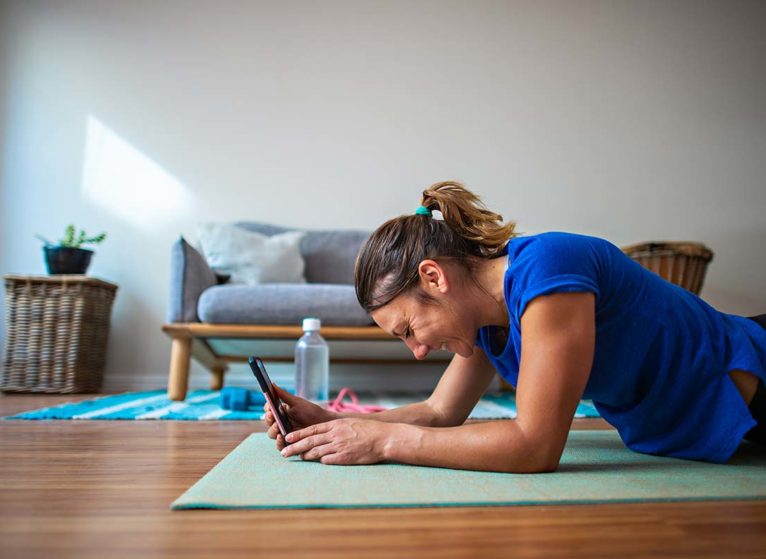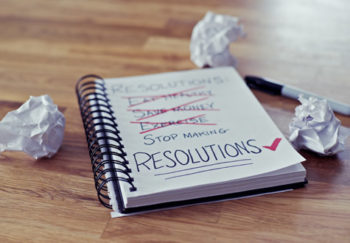Lisa Farr, manager of UVA’s Exercise Physiology Core Lab, contributed this post.
Pandemic fatigue. Pandemic 15. Pandemic stress.
COVID-19 has wreaked havoc in so many ways.
Many of us got sick or worried about sick loved ones. For others, there was the stress of working in healthcare or an essential business. This pandemic has taken a toll on the physical and mental health of most Americans.
It’s no wonder that many people are ending 2020 a few pounds heavier, a little less fit, and mentally taxed out.
If you’re one of those folks who fell off track in 2020 — what might work for you in 2021?
How to Start Exercising: Don’t Underestimate The Power of Habits
Most of us brush our teeth every day. We don’t debate with ourselves, “I’ve already worn my seat belt three times this week — skipping it won’t hurt.” These things are so automatic that we don’t question them.
So while any exercise is better than no exercise, setting a goal of daily exercise just might be the thing you need. Why? You want it to become automatic too, just like teeth brushing and seatbelt wearing.
Exercise reduces anxiety and improves mood. Daily exercise also:
- Boosts your metabolism
- Burns calories
- Helps you feel less stiff
Over the long haul, a daily workout routine adds up to better fitness, strength, and mobility. It helps you reach health goals.
Developing the Daily Exercise Habit
Research indicates that it takes time to form a new habit. Simple habits might take 21 days; harder ones several months. How do you make sure you set yourself up during these initial months?
Anticipate barriers. Have a plan. Be accountable. It feels harder, mentally and physically, at the beginning than it will down the road.
Schedule your Workout
Don’t leave it up in the air. It’s too easy for life to get in the way. If you’re not motivated to exercise before work, you may not be motivated after work (when you’re hungry and tired!) either.
So set a schedule and try not to alter it without a really good reason. Set a reminder on your watch, or enter the exercise time in your calendar just like you would an important commitment.
Know What You’re Going to Do & Plan for It
If you’re exercising outdoors, check the weather and set out appropriate clothes. If you’re exercising indoors, pack your bag so that you’re ready to go.
Accountability Helps
For most people, working with a trainer, or exchanging supportive texts with a friend might be the extra push needed. Have a fitness champion in your corner!
You can also be accountable to yourself. Keep a fitness journal or use an exercise-tracking app.
Be Structured, Yet Flexible
Don’t negotiate whether you do your daily exercise. But be flexible about the workout length and type. If you’re planning to run outside but wake up to an icy rain, have an indoor plan B.
Hoping to walk for an hour but then realize you have an early meeting? Get in a half hour.
Sticking to your schedule is better than doing nothing because you didn’t have time to do it all.
Avoid Boredom and Injuries
Mix it up. Don’t do the same type of exercise every day. It’s important to stress your body in different ways. The last thing you need is to be derailed by an overuse injury.
Boredom makes it harder to stay motivated. If you’re exercising indoors, try:
- Playing music
- Watching a TV show
- Following an instructor-led video or app. The pandemic has led to many new online exercise options!
If you’re exercising outdoors, change your walking route so that you see different sights and mix up the terrain.
Need Help Starting a Daily Exercise Routine?
Our exercise physiology lab helps you get the info you need to lose weight and improve athletic performance.
Besides building the habit, new and returning exercisers need to remember safety:
- Ease in.
- Start with moderate exercise, not vigorous.
- Make sure you’re setting equipment correctly. Most manufacturers have online instructions or videos.
- Be mindful of weather — bridges and brick sidewalks can get icy easily.
- Protect yourself from COVID. If you’re exercising outside of your home, follow local and state guidelines around social distancing and wearing a mask.
According to the American College of Sports Medicine, most people can exercise safely without visiting their doctor first. But you should visit your doctor if you have diabetes or heart, lung, or kidney disease, or symptoms of any of these conditions.
Here’s to a healthier, fitter 2021! Hopefully, it’ll be a year with far less stress, too.


